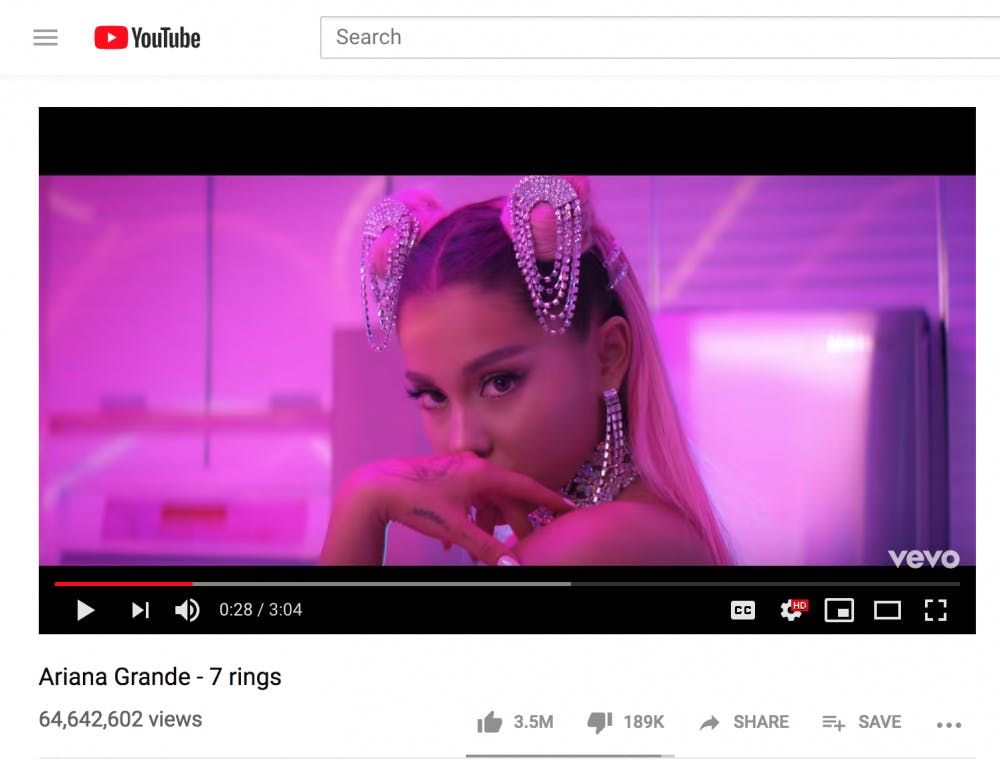On Jan. 18, Ariana Grande released “7 Rings,” a song that had a lot of artists calling the pony-tailed pop princess a copycat. Part meme, part personal attack, music fans accused the artist of drawing a little too much inspiration from artists like Soulja Boy, Princess Nokia and 2 Chainz.
If you listen to the songs that allegedly have been used for reference, it is not a clear case of copycatting. The beat in Grande’s song is generic enough for it to be unfair to claim that the song is a copy of Soulja Boy’s “Pretty Boy Swag.” On the other hand, I do see where Princess Nokia is coming from when she asks, “Does that sound familiar to you?” when comparing Grande’s “7 Rings” to her song “Mine.” Either way, the only obvious sign of duplication is Grande’s use of The Sound of Music’s “My Favorite Things”-esque beat throughout the song.
Originality in music is a tricky thing. In a constant state of absorption, artists create music from a myriad of influences. Almost every song we have listened to is a version or extension of some other song that we have probably never heard. And say a song is neither a version nor extension; tracks use samples of other (often older) songs and similar instruments and beats to fit what is popular.
To me, innovative music happens when multiple, pre-existing musical elements come together in a way that has yet to be heard before. It doesn’t require invention of an entirely new instrument. But new music is hard to come by and is by no means easy to make, especially when a mathematical equation could be working against new music.
Similar to a social media website, Spotify utilizes an algorithm to curate content for its users. This algorithm makes it easier to listen to songs without doing the searching yourself, but the process also makes it harder for songs to break into your repertoire. It could be the case that the same band makes it to your daily playlist week in and week out. Or you may hear an older, popular song and wonder why you’ve never heard it before. Essentially, the algorithm creates a music bubble that makes it hard for people to listen outside of their comfort zone, and it can feel like you're listening to the same song.
Some artists choose to play into the algorithm of their respected genre. If a new release is similar enough to historically popular singles, yet at the same time done well enough to disguise old elements, you might just have the hit of the week in your mix. Artists who do this are by no means sell-outs, but they keep those who pay the bills (aka fans) happy. At the end of the day, it's fans who are promoting similar songs.
Music creators who are daring enough might attempt to expand their bubble outside their genre. This risky move might require borrowing fundamentals from artists who are known for the genre. When trying something new, artists might look to a theme that has already shown some success.
Ariana Grande and her producers probably did not intend to copy any one artist but just cash out on a general appealing aesthetic of airy vocals, millennial pink and catchy rap that reminds us of our younger days singing along to Maria von Trapp.
With so much content and the algorithm only picking a small ratio to reach the ears of the masses, popular songs start to sound the same. Creating hit-worthy tunes sometimes leads to producing songs that make us ask each other “Does that sound similar to you?”
Jackie DeFreitas is a UF journalism junior. Her column appears on Wednesdays.
Screenshot by The Alligator






